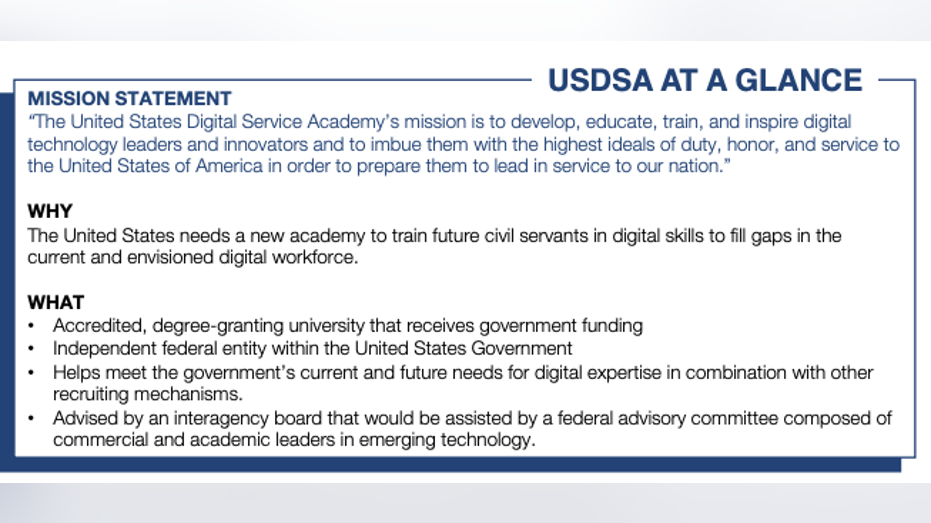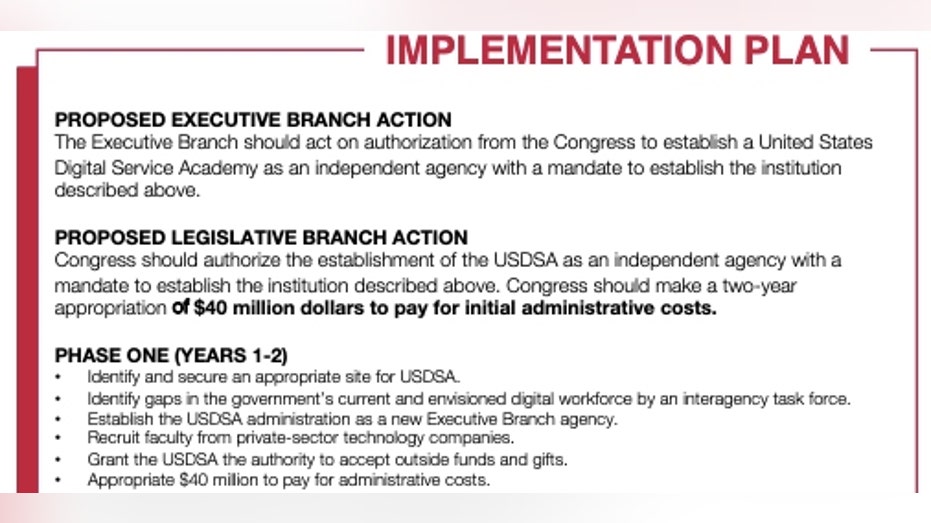Former Google CEO leads federal tech college initiative
The National Security Commission on Artificial Intelligence wants $40M over 2 years for digital service academy
Former Google CEO Eric Schmidt is working to create a federally funded tech college as part of a government initiative to educate future coders, cyber-security experts and scientists.
The National Security Commission on Artificial Intelligence, a government commission focused on advancing AI technology and machine learning established in 2019, voted unanimously to recommend the school called the U.S. Digital Service Academy in an upcoming report to Congress.
Schmidt said Wednesday during a press call that "we all believe that there is a vast shortage of the talent" the U.S. government needs to compete technologically "in a world shaped by strategic competition."
"The national security challenge is urgent, and there is a need for dynamic change," he said during the call.
Schmidt and Deputy Secretary of Defense Robert O. Work are leading the initiative to launch the school that would train students in subjects such as cybersecurity and artificial intelligence.
MICROSOFT JOINS AMAZON, IBM IN HALTING POLICE USE OF FACIAL RECOGNITION TECHNOLOGY
"The United States Digital Service Academy’s mission is to develop, educate, train, and inspire digital technology leaders and innovators and to imbue them with the highest ideals of duty, honor, and service to the United States of America in order to prepare them to lead in service to our nation," the proposed school's mission reads, according to the recommendation.
The artificial intelligence commission is trying to expand the digital literacy of the entire government and the Defense Department, Work said during the call.

USDSA recommendation (USCAI.gov)
He and Schmidt emphasized the point that the academy would build links between the government and private sector so they could better understand each other as the two become increasingly reliant on the other.
APPLE DEFENDS APP STORE AHEAD OF HOUSE HEARING
The artificial intelligence commission is asking Congress to appropriate $40 million over two years to pay for the school's initial administrative costs. The commission expects the first class to graduate in about six to seven years, or by 2027.
GOVERNMENT JOB LOSSES ARE PILING UP, AND IT COULD GET WORSE
The cost for students' education at the digital academy would be repaid in the form of a five-year obligation to work as a civil servant after graduating, the recommendation states. Majors would include AI, software engineering, electrical science and engineering, computer science, molecular biology, cybersecurity, mathematics, physics and more.

USDSA recommendation (USCAI.gov)
"This is offering a full ride for men and women who want to pursue these technologies ... and they would owe the government a five-year return," Work explained. "They would work in the government starting as a GS-7 and work up the chain."
AI IDENTIFIED CORONAVIRUS BEFORE IT SPREAD. HERE'S HOW IT CAN CONTAIN FUTURE CONTAGIOUS VIRUSES
He added that graduates "would join the Googles, Apples and Amazons of the world," but they would also help government departments develop their understanding of more advanced technologies to help the U.S. stay competitive with other countries.
VIRUS EXPOSES SHARP ECONOMIC DIVIDE: COLLEGE VS. NON-COLLEGE
The commission also made 35 additional recommendations including a Scholarship for Service program and a National Reserve Digital Corps.

Executive Chairman of Alphabet Inc., Google's parent company, Eric Schmidt speaks during a National Security Commission on Artificial Intelligence (NSCAI) conference November 5, 2019 in Washington, DC. (Photo by Alex Wong/Getty Images)
The artificial intelligence commission was created to advance U.S. science and technology and better compete with other technologically dominant countries like China and Russia.
GET FOX BUSINESS ON THE GO BY CLICKING HERE
Schmidt, who attended UC Berkley, wrote a 2018 op-ed for The Sacramento Bee in which he expresses support for more funding put toward public schools and universities, specifically in California, where tech entrepreneurs have flocked to turn their ideas into realities that have shaped the modern world.
"The investment of public funds in public universities has paid Californians back many times over. In fact, study after study shows that when it comes to public spending there is no better investment than higher education, with every dollar spent generating as much as seven dollars for the state’s coffers," Schmidt wrote.




















